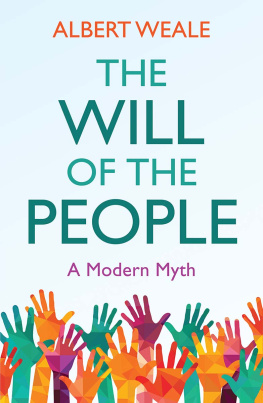
The Will of the People
A Modern Myth
Albert Weale
polity
Copyright Albert Weale 2018
The right of Albert Weale to be identified as Author of this Work has been asserted in accordance with the UK Copyright, Designs and Patents Act 1988.
First published in 2018 by Polity Press
Polity Press
65 Bridge Street
Cambridge CB2 1UR, UK
Polity Press
101 Station Landing
Suite 300
Medford, MA 02155, USA
All rights reserved. Except for the quotation of short passages for the purpose of criticism and review, no part of this publication may be reproduced, stored in a retrieval system or transmitted, in any form or by any means, electronic, mechanical, photocopying, recording or otherwise, without the prior permission of the publisher.
ISBN-13: 978-1-5095-3329-9
A catalogue record for this book is available from the British Library.
The publisher has used its best endeavours to ensure that the URLs for external websites referred to in this book are correct and active at the time of going to press. However, the publisher has no responsibility for the websites and can make no guarantee that a site will remain live or that the content is or will remain appropriate.
Every effort has been made to trace all copyright holders, but if any have been inadvertently overlooked the publisher will be pleased to include any necessary credits in any subsequent reprint or edition.
For further information on Polity, visit our website: politybooks.com
Acknowledgements
This book was written in a hurry and I prevailed upon the following people to read an earlier draft of this book, when they had good reason for doing other and more pleasurable activities. I should like to thank each and every one of them for their comments, criticisms and support. These people are Richard Bellamy, Sarah Birch, Roger Butler, Robert Field, Bob Goodin, Kasim Khorasanee, Des King, Jan King, Jeff King, Rudolf Klein, Ccile Laborde, Michael Lane, Pam Leadbetter, Joni Lovenduski, Iain McLean, Ted Marmor, Cas Mudde, Jack Nagel, Ian OFlynn, Onora ONeill, Katie Petty-Saphon, Jason Poole and Alan Ware.
Included in this group is a number of people who are not professional political scientists but took on the burden of telling me whether or not I was making sense outside of narrow specialist circles. I will not pick them out by name; they know who they are. But I am particularly grateful to them not less than to my professional colleagues.
I thank the board of Polity for responding so positively to my suggestion that a book on the will of the people was timely. Originally the project arose from an almost casual enquiry on my part to David Held, whose abilities as a publisher are only matched by his skills as an analyst and commentator on politics and the global order. John Thompson kept me on the straight and narrow, always reminding me that inner conviction was no substitute for cogency of argument. Manuela Tecusan assiduously copy-edited the typescript to improve its clarity.
Jan Harris, as always, restored my sanity during the obsessive work of writing. She reinforced the sense that the argument needed to be advanced and allowed space in our lives, so that it might be written. What more could one ask?
Preface
This book arose from one specific incident in British politics. On 3 November 2016 the High Court gave its judgement in the Miller case. At issue was the question of whether the UK government needed parliamentary approval to trigger the process by which the United Kingdom would leave the European Union. The government argued that it did not need such approval. The three judges ruled that it did. On its front pages the following day, the Brexit-supporting press attacked both the verdict and the judges who had made it. The judges versus the people exclaimed the Daily Telegraph. Enemies of the people pronounced the Daily Mail in chorus, adding for good measure that one of the judges was an openly gay former Olympic fencer. (The Mail did not make clear whether it was being gay, being a fencer, or being both that made the judge an enemy of the people.)
These responses were bad enough. To make matters worse, no cabinet minister, not even the Secretary of State for Justice, was prepared to explain and defend publicly the role of the courts in judging constitutional controversies. Here was a matter that the government itself had agreed was rightly a matter for the courts. In England, legally contesting the constitutional right of the government to act by executive decree goes back at least as far as the seventeenth century. Indeed, it is not hard to see that the government itself had an interest in resolving the uncertainty about its constitutional powers in such an important matter. And yet responsible ministers in the government remained silent. I had never thought that a government in the United Kingdom would undermine the rule of law and the constitution of the country it governed. I was wrong.
Yet I should not have been surprised. Theresa May had already said at the Conservative Party conference the previous month that those who argued that initiating the process for leaving the European Union could only be triggered after agreement in both Houses of Parliament were not standing up for democracy but trying to subvert it. For her, the referendum of June 2016 had expressed the will of the people and it was not the place of parliament to undermine that will. You need to take a deep breath before you even attempt to get your mind around the steps of this argument. It begins by equating the will of the people with the outcome of the referendum. It goes on to equate government policy with the referendum result. It ends up by equating government policy with the will of the people. In consequence, parliament becomes the enemy of democracy and has to be replaced with government by executive decree. And all this in the name of the will of the people! As a citizen of a democratic country, you know you are in trouble when a political party any political party claims to embody the will of the people. One people; one will; one-party state.
How could the idea of the will of the people so shape political decision-making about the most important matter of policy that the United Kingdom has faced in decades? One answer is that those who talk about the will of the people are confusing democratic government with populist government. Populists think that government policy should be decided by the people, who should directly mandate governments to do its will, without any need for parliamentary debate or opposition. Around the world, populist political parties and movements both on the left and on the right are mobilizing around the claim that, if the people governed directly, all would be well.
David Hume once said that the errors in religion were dangerous, but those in philosophy only ridiculous. This book suggests that errors in political philosophy can also be dangerous. The will of the people is an idea drawn from political philosophy that has now become a modern myth. It fosters the populist error that democracy means the direct determination of government policy by the people. Paradoxical as it might seem, that view all too often has the effect of putting more power into the hands of the executive. When parties in government purport to speak for the will of the people, they can manipulate politics to their own ends. When the idea of the will of the people is used to silence dissent about an important political choice, then a fundamental principle of constitutional democracy that democracy is institutionalized debate in which competing views are expressed within a set of rules has been lost. Any pervasive myth is dangerous in a democracy; the myth of the will of the people is particularly dangerous.
Next page






